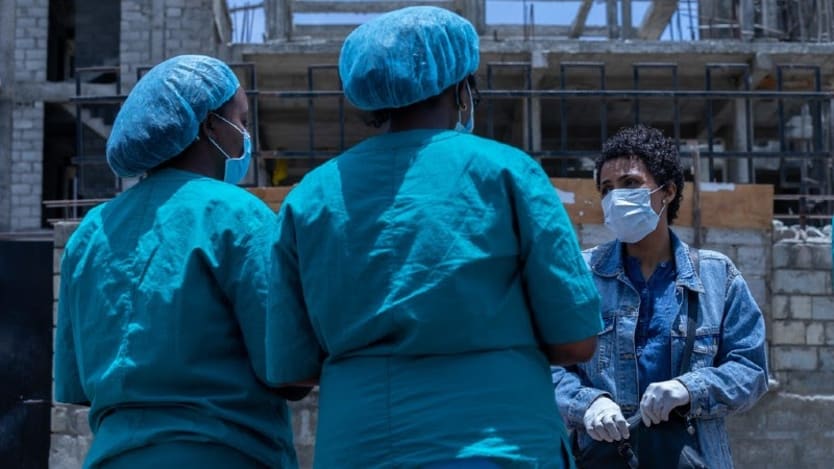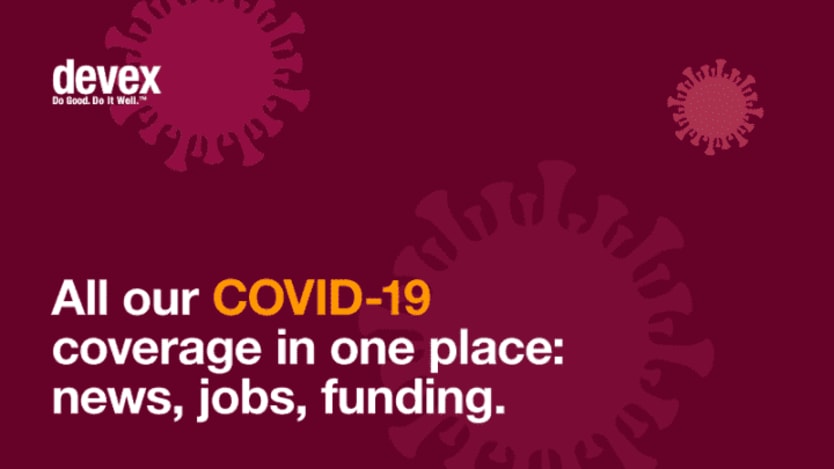Q&A: How are global health security experts responding to the pressures of COVID-19?

CANBERRA — Adam Kamradt-Scott is just one of the experts specializing in global health security and pandemic preparedness who is being called on to support governments, industry, and more in responding to the coronavirus crisis.
The support he has provided to date includes participating in an emergency meeting about trade and travel measures with the World Health Organization, advising the Asian Development Bank on work they have been looking to do in response to COVID, supporting Australian universities in their health and recovery response — and resigning when it became unproductive — as well as supporting a “tremendous amount” of media inquiries.
Working for the University of Sydney, Adam Kamradt-Scott’s 20 years’ experience helped prepare the former emergency nurse for what the world is facing. Kamradt-Scott shared with Devex the pressure experts such as himself are facing in supporting global needs.
“No country can afford to dismiss the risk of a second wave.”
— Adam Kamradt-Scott, global health security scholar, University of SydneyThis conversation has been edited for length and clarity.
How do you manage requests to comment, contribute, and collaborate? Do you need to look at what is the most productive use of your time and where you can deliver value to?
In the first number of weeks, perhaps the first two months of the pandemic, everyone was in reactive mode. You’d get requests and try to do your best to meet them. Now that things have slowed down a little bit for us here in Australia, it has given me at least a bit more time to think more strategically about what I agree to and what I don’t.
So now any requests I receive — and this includes journal article reviews — I try to evaluate what benefit it will provide. Will this help to further inform the public health response, or will it be a distraction? And I make a determination based on that.
How to build a global health security movement
Global health security has long suffered from a "cycle of crisis and complacency." Advocates hope the current pandemic might finally help change that.
With a number of peer review requests we are receiving, we find that a number are half-baked or researchers have rushed to publish something which may not be helpful — or may only be part of the story.
Are your international colleagues in the same position as you, to be able to step back and assess their work?
No. I’ve got a number of colleagues in the United Kingdom as well as the United States — countries that have continued to see large rates of transmission and fatalities. They are still very much in the middle of that crisis response. And I think most people are still just trying to keep their head above water.
Just because you have breathing space now, that doesn’t mean you will in the months ahead. Are you looking at strategies and support to ensure you are balancing work with personal and mental health?
The short answer is that there’s no strategy. I recognize there is a very strong potential for burnout, and I think I have been close to that already on a couple of occasions. But in the event that Australia ends up back in the middle of it, the reality is that again it’s all hands on deck. And this includes people supporting policies and providing advice.
So I’ll be honest — there’s no plan. One of my big concerns, and I know that a number of my colleagues share this, is a second wave. Because Australia has not witnessed the level of deaths we have seen in other countries, whereby people know people who have died, there is a danger here that people are viewing this as a storm in teacup. And I’m seeing this among my friends on social media.
But we’ve got enough evidence of what happens when we unwind restrictions too quickly and rapidly. No country can afford to dismiss the risk of a second wave easily, and I think unfortunately we’re likely to be in the same situation for at least the next 12 months. That is unless you adopt a policy like in Sweden where you allow the virus to sweep through — and say sorry if you don’t live.
In terms of your involvement with advising government and industries, do you feel you are being heard and your advice taken on?
No [laughs]. For someone like myself who has spent 20 years thinking about pandemics and policy responses and what happens in terms of response and recovery, I am living through a lot of what has been discussed in policy and theory in the past couple of decades. But for many people I am talking with, they are coming to grips with these issues for the first time. So at the moment, I think there is a level of people who don't know what they don’t know.
On the other side of this, everyone is going to be an expert in pandemic preparedness — which is conceivably a good thing. We are unfortunately likely to see these events in the future again, so hopefully, this will be an opportunity for the world to get better prepared.
But there is definitely a dynamic at the moment where people are only thinking about the consequences of these issues for the first time in their lives. It is a bit of a challenge for them to then hear projections of how things are going to unfold, because it is so far out of their comfort zones and existing knowledge base.
Has this pandemic exposed governments and sectors that have not been as prepared as they claimed?
We have had people for years saying we need to do more about preparedness — and we’ve had people’s eyes glaze over. On the other side of 2009, people didn’t want to talk about pandemic preparedness — they had pandemic fatigue. I had conversations with government officials and health officials around the world who said we were prepared, but of course, we weren’t. And it was a false sense of security being generated.
The extent to which this is going to shake things up, I’m a little more cynical. Humans have a tremendous ability — in order to move past trauma — to forget what has happened and seek to resume as normal a life as soon as possible. And the world is going through a collective trauma. The world is being traumatized by a pandemic. Our desire to get back and move back past that may mean we lose all of the lessons we should be learning, and we will find ourselves back in the same situation again.
This is going to be particularly challenging with governments, given how much they are spending, to think seriously about spending additional resources when they are already in debt to strengthen health systems and capabilities to prevent the next event from being as bad.
This is precisely the dynamic, I fear, we are going to face on the other side of the pandemic.
Visit our dedicated COVID-19 page for news, job opportunities, and funding insights.

Search for articles
Most Read
- 1
- 2
- 3
- 4
- 5








